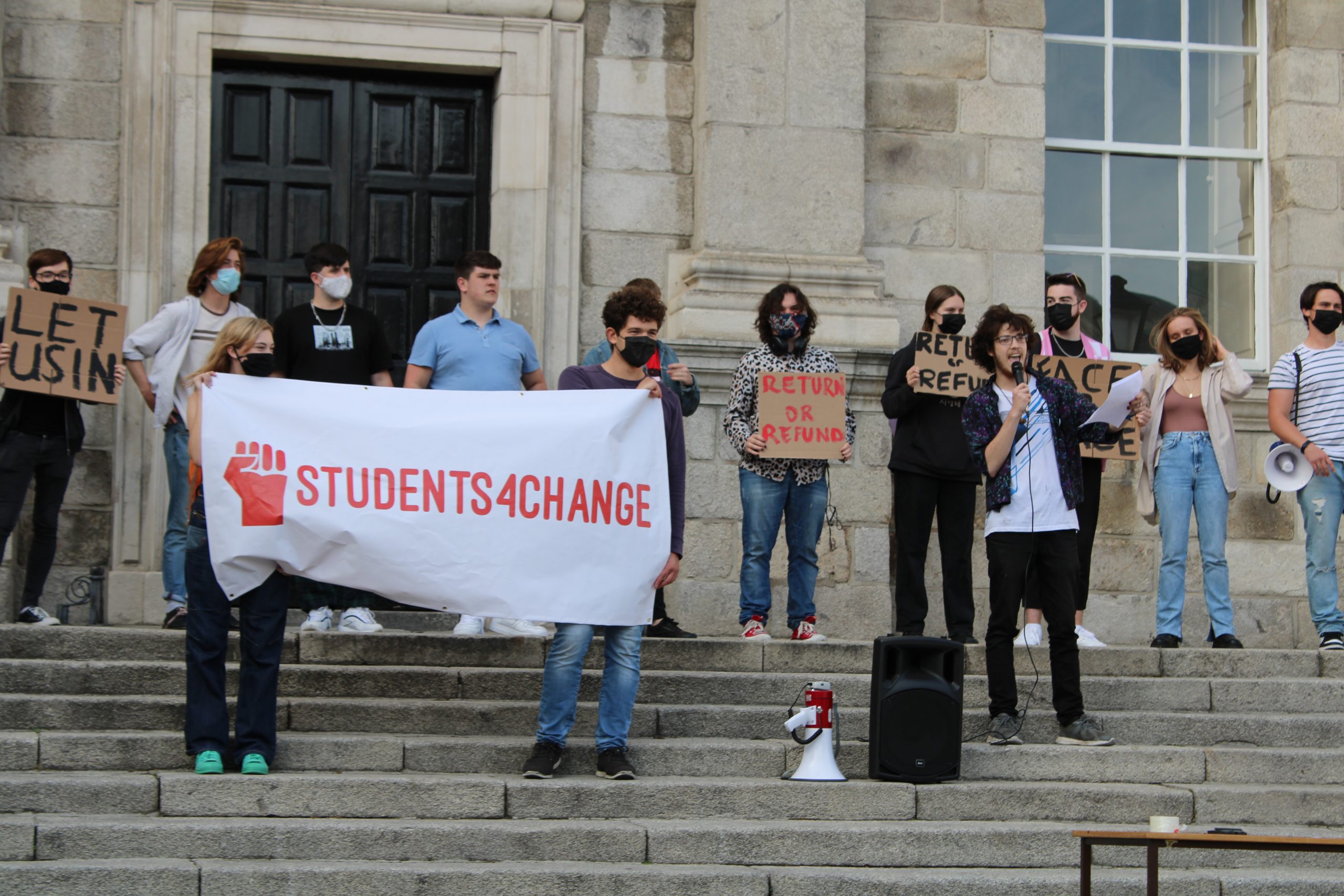Students 4 Change (S4C) held a town hall meeting in the Pav marquee today.
The campaign group organised a protest last week against College’s handling of the return to campus which attracted several hundred students but just a dozen people, including the organisers and media, attended today’s meeting.
GSU President Gisèle Scanlon joined the meeting approximately an hour after it began.
S4C is seeking a meeting with representatives of Trinity College Dublin Students Union (TCDSU), the Graduates Students Union (GSU), Trinity College Dublin Renters’ Union (TCDRU), Trinity College Dublin Face 2 Face (F2F) and S4C in the room.
As well as campaigning on the reopening of campus, the group is also advocating for College to expand access to the library and place increased focus on student mental health.
In order to achieve these demands, S4C plans to “force [College’s] hands through direct action to make change”.
Molnárfí began the town hall meeting by discussing S4C’s constitution and its demands.
He said that he had received a “conciliatory” email from Provost Linda Doyle following last week’s protest, but said that while he was “sure she’s a nice person”, S4C sees the problems with Trinity as “institutional”.
In relation to College’s response to their demands, Molnárfi said: “We have gotten absolutely no reply”.
He continued: “They want to delay us and hope that our demands will fizzle out. We need to force their hand.”
Molnárfí said he regretted using the phrase “we pay your wages” at the protest, stressing that he preferred to characterise the movement as one of students rather than one of “consumers”.
Molnárfi believes that College are “not taking us seriously, they’re not taking students’ demands seriously”.
“They will take us seriously when we are marching into their offices.”
“We should be proactive not reactive” in response to College dismissing their demands, Molnarfi said.
He also called for a movement which expanded beyond just student concerns: “We need unity with professors, auxiliary staff and students.”
According to Molnárfi, the vast majority of non-academic staff within Trinity “don’t trust the administrative system”.
Concerning in person teaching in comparison to online classes, a student at the meeting said they “wouldn’t be surprised if most classes will be online until after Christmas”.
The meeting then spent time discussing a range of issues around accommodation and college administration.
A student was heard saying that College security “treat us like children”, a sentiment echoed by Molnárfi and several others.
On the topic of College’s phased reopening to in person activity, Scanlon weighed in and said while she has “patience” for the plan, she doesn’t condone College’s treatment of last year’s “forgotten” first year students who had college completely online.
Molnarfi said while he doesn’t necessarily want College to abolish Schols, he would like to see it “reformed”.
On the subject of direct action and how to see S4C’s demands achieved, Molnárfi cited a need to “collectively organise” with other groups and disgruntled students in general.
“We need to remind [College] that we exist,” he said, and while he didn’t lay out a specific plan of action, he did cite Take Back Trinity’s occupation of the Dining Hall in 2018 as a potential inspiration.
In documents circulated in advance of the meeting, S4C says it is using an anti-capitalist, anti-consumerist theoretical framework: “We shouldn’t frame our demands as consumers” and “instead, we should rally against the transactional, consumerist interpretation of education”.
The group has begun describing itself as an organisation of Marxist and anarchist students, but says “we operate on the principles of the united front, which means that a wide variety of left-leaning students and organisations take part in our actions”
Some of their other demands include asking College to “consider the possibility of open-book exams”, with the exception of “medicine and other courses which require otherwise as per common-sense”. The group notes it is “absolutely against the use of Proctorio” to administer exams.
Additionally, the group wants to see harassment and misogyny within student societies addressed and to tackle a number of other student concerns, including College security seizing alcohol from students.
Approximately two to three hundred students were in attendance at S4C’s protest last week, with one student telling Trinity News that they were “fed up” with Trinity’s miscommunication about a return prior to the speeches given.
TD for the Socialist Party Mick Barry also attended the protest.
TCDSU sabbatical officers were also seen amongst the crowd at the protest, as well as representatives of the Union of Students in Ireland (USI) and GSU President Gisele Scanlon.
Provost Linda Doyle was also present, listening to speeches.
This was the first protest to take place in Trinity since the beginning of the pandemic, with many students disgruntled by College’s handling of the return to campus.






